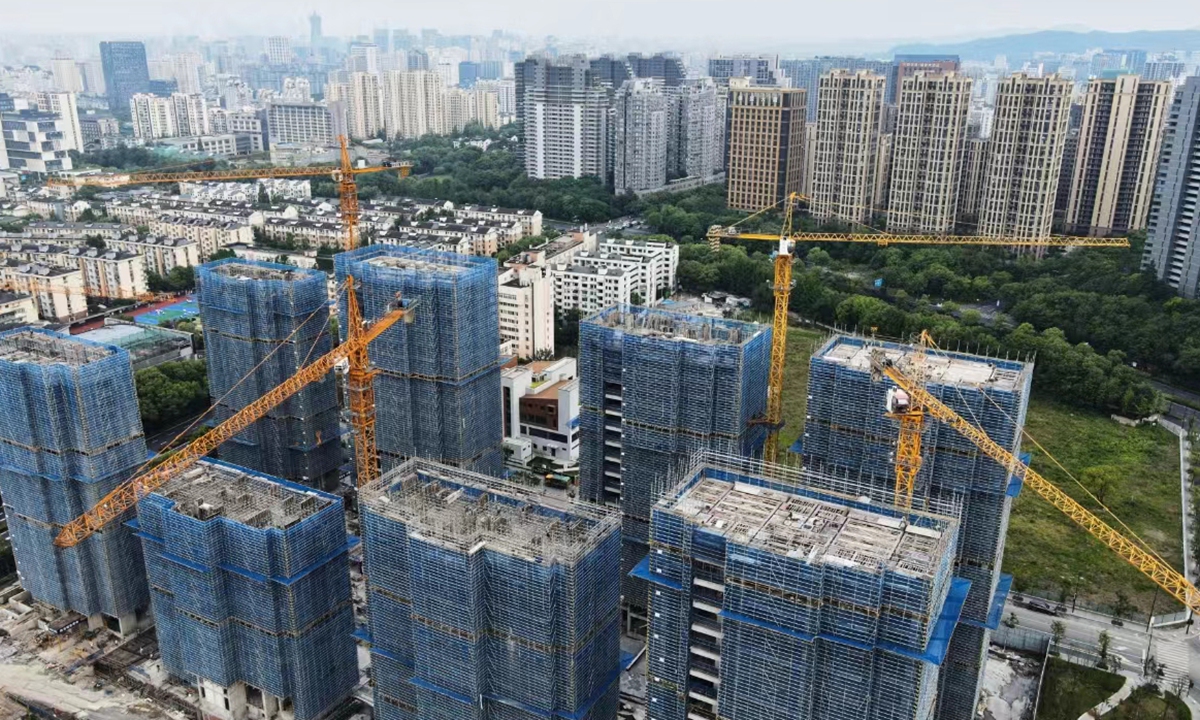Encouraging signs emerge in China's housing market despite falling prices: NBS officials

A view of a residential property project under construction in Hangzhou, East China’s Zhejiang Province on May 9, 2024. The city announced the same day that it will lift all home purchase restrictions, making it among the first Chinese cities to completely abolish purchase restrictions amid a nationwide effort to shore up the real estate market. Photo: VCG
There have been positive developments in China’s property market, with the decline in sales of new homes narrowing in the first five months despite sales prices of commercial residential buildings in 70 medium and large-sized cities in May decreased month-on-month, in both new and second-hand home prices, data from the National Bureau of Statistics (NBS) showed Monday.
Prices of new homes were down 0.7 percent in May from the previous month in first-tier cities, namely Beijing, Guangzhou and Shenzhen. In annual terms, new home prices were down 3.2 percent from a year earlier in first-tier cities, official data showed.
Despite the decrease in prices, NBS spokesperson Liu Aihua pointed out that there have been positive developments in the property market, with the year-on-year decrease in sales of newly built residential housing narrowing in the first five months of the year.
"Since mid-May, with the further optimization of real estate policies by relevant departments and regions, the real estate market has shown some positive changes," Liu stated, adding that despite the ongoing adjustments, the market is still in a transitional phase, and the full impact of the policies has yet to be realized, Liu added.
China's fixed-asset investment rose 4 percent year-on-year in the first five months of 2024. Investment in property development fell 10.1 percent year-on-year during the January-May period, according to the NBS. Excluding the property development investment, the country's fixed-asset investment climbed 8.6 percent during the first five months, the Xinhua News Agency reported.
In the first five months, fixed asset investment (excluding rural households) reached 18,800.6 billion yuan, representing a 4 percent increase compared to the previous year. When excluding investment in real estate development, overall fixed asset investment saw an 8.6 percent growth, according to the NBS’s official website.
The Chinese government has placed significant emphasis on the real estate sector, emphasizing the need to ensure the effective implementation of existing policies and to continue researching and preparing new measures to stabilize the market and reduce housing inventory, Liu said.
On May 17, the People's Bank of China, and the National Financial Regulatory Administration released a set of policies to stabilize the real estate market, a pillar industry underpinning the world's second-largest economy. Local governments have rolled out new measures to support the real estate market, including providing 300-billion-yuan ($41.35 billion) relending facility for the government-subsidized housing project, reducing down payments and relaxing certain restrictions on home purchases and reducing financial requirements.
Since the implementation of these new measures, there has been a noticeable uptick in market activities and confidence among consumers and investors.
Recent adjustments in real estate policies have led to a boost in market confidence and home-purchasing activities, Yan Yuejin, research director at Shanghai-based E-house China R&D Institute, told the Global Times on Monday.
Market activities in several core cities have increased, especially in the second-hand housing market where transactions have started to rise. For instance, Shanghai has seen daily transactions exceeding 900 sets in the second-hand housing market since the end of May, and the figure for Shenzhen grew by more than 40 percent year-on-year in May, the Beijing News reported.
The Global Times learned from several housing agents in Beijing that real estate market has experienced a surge over the past month, with a higher number of potential house-hunters and rise in transactions. Some agencies have even raised their goals for the number of properties shown to clients.
Virtual tours also increased. “There were more than 60 client reservations in one day, and fewer staff members were staying in the office, as the majority are now out in the field, showing houses to their clients,” a Beijing-based real estate agent surnamed Liu told the Global Times on Monday.
As the market continues to revive and the effects of the new policies gradually unfold, Liu said these measures will take some time to have an impact and the property market remains in the process of adjustment.

